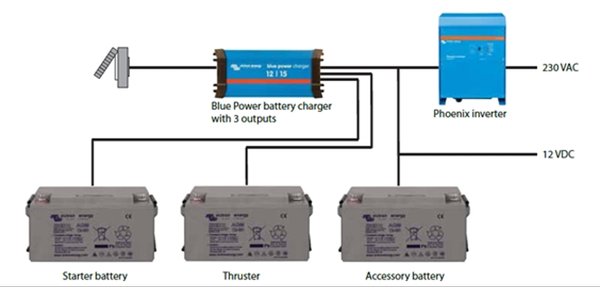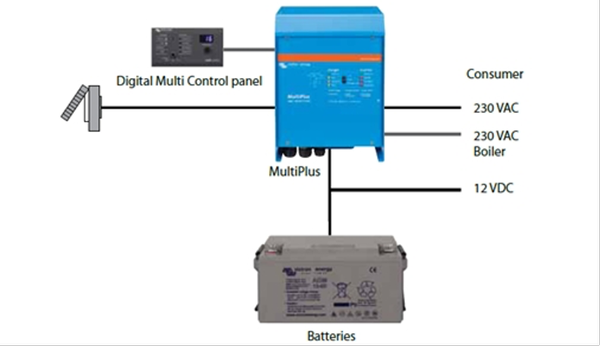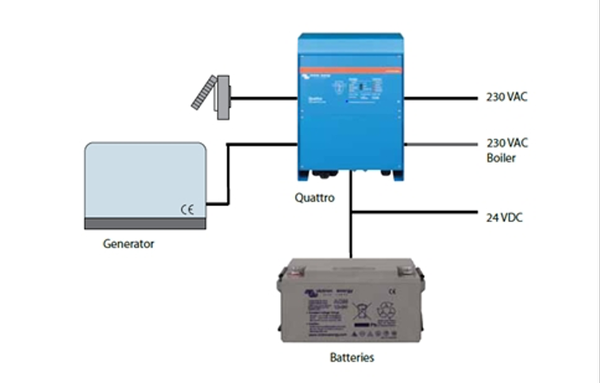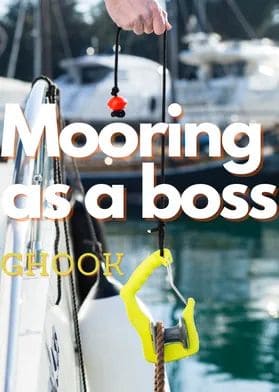Charger & Inverter combinations for Boat
On this page, you can choose and purchase the appropriate charger and inverter combination for your boat or yacht. We offer only the best manufacturers with a guarantee of quality performance. We will deliver your order to any location worldwide.
When selecting the suitable charger and inverter combination, it is important to consider the power needs of your boat and the type of battery. We recommend consulting professional marine electricians or referring to the manufacturer's specifications for your yacht before making a purchase.
Also, pay attention to the electrical load that will interact with the inverter. This factor affects the battery runtime and overall power consumption on the boat.
The installation of the chosen charger and inverter combination should be done by professionals. Adhere to all necessary safety precautions to ensure that your boating journey goes as planned.
About Charger & Inverter Combinations
An inverter combined with a charger is a reliable source of continuous power supply to on-board equipment on a boat, yacht or car. In a typical marine vehicle electrical system, the charging inverter performs two main tasks. Firstly, it converts the DC voltage of the battery into alternating voltage to power 220 V on-board equipment in autonomous mode. Secondly, when the landline network is available, the charging inverter automatically switches to it, transmits shore power voltage to the vehicle and simultaneously charges the inverter battery.
Types of Inverters Combined with a Charger
Manufacturers equip modern charging inverters with a large number of additional functions. Entry-level models simply work in two directions - as an inverter and as a multi-stage charger. More complex ones monitor the current consumed by the charger and automatically reduce it if shore power is limited.
At the top of the range are charging inverters with cogeneration. These devices are capable of synchronizing their output with another AC voltage source and operating simultaneously with it. Them working together can significantly reduce the power of the additional generator installed on the yacht and reduces the consumption of electrical energy from the shore network.
Charging inverters can be high-frequency or linear. The first type of device is compact and lightweight, but can withstand overload for a very short period of time, so it does not cope well with powering an inductive load. Linear models are much more massive and larger, but they are capable of ensuring almost complete autonomy of the boat’s electrical system. Linear charging inverters can power air conditioners, hand-held power tools, microwave ovens, and other high-power devices with high inrush currents.
Combination devices, produced by Victron Energy, Ultimatron France and other leading manufacturers of marine equipment listed on our marketplace, include a sine wave inverter and charger, provide high-quality uninterrupted power supply, instantly switching the load to power from the inverter in the event of a loss of shore power or generator.
Power Assist function will prevent the overload fuse from tripping when connected to a weak coastal network or a low-power generator, assisting the network with power from the inverter, while the frequency and phase patterns will be synchronized automatically.
Can be used both on a boat and in a country house as an element of an uninterruptible power supply system. Unlike “land” analogues, having significant power, it does not require connection to 24- or even 36-volt batteries - it is powered from the most common 12-volt network.
The presence of a powerful built-in automatic charger allows you to always keep the batteries in good shape: at every opportunity, as soon as power is available, the charger turns on and replenishes the battery charge consumed during autonomous operation.
The temperature sensor allows the charger to adjust the operating mode depending on the temperature of the battery. The charger of the models can work with all types of lead-acid batteries, as well as lithium MLI batteries. Built-in galvanic isolation prevents the development of galvanic corrosion on the ship's hull elements when connected to the onshore network.
There is protection against overheating, overload, short circuit, overvoltage and automatic shutdown when battery voltage is low.
How to Choose Charger & Inverter Combinations
The choice of such a kit on a ship depends on the needs of the yacht - that is, on the power consumption of all electrical devices and equipment. Let's use Victron Energy equipment as an example, presented in the topRik marketplace in a wide range, we will consider several options for power supply schemes for yachts and boats.
The Simplest Diagram of a DC Network
Here’s the example.
The charger feeds the battery from shore power.
All consumers are powered from a 12 V network.
The battery capacity is determined by the load power and the duration of the autonomous power supply. The charger is selected taking into account the charging current.
Set contents in this case:
- Blue Power battery charger device.
- Batteries.
Inverter System
If necessary, the charger can charge 1, 2 or 3 batteries independently of each other.
Consumers powered by 12 V DC are connected directly to the battery. The presence of an inverter in the equipment allows you to connect consumers powered from a 230 V AC network.

Set contents:
- Blue Power battery charger device.
- Phoenix inverter.
- Batteries.
Multifunctional Scheme
MultiPlus inverter functions as both a charger and an inverter. The device has a PowerAssist function, which allows you to power peak loads from the shore power supply and the battery simultaneously. This reduces the requirements for the onshore power supply. Once the load is reduced, the shore power automatically continues to power the load and charge the battery.
Another function that the inverter supports: PowerControl. When initializing it, the upper level of consumption from the coastal network can be set. If this level is exceeded, the inverter temporarily limits the charging current.
The inverter has 2 outputs, one of which is active only when there is a shore power supply.
The presence of a control panel in the equipment allows you to monitor and manage the state of the power supply system.

Set contents:
- MultiPlus inverter.
- Batteries.
- Digital Multi Control Panel.
Generator System
Quattro inverter belongs to the next generation of inverters with expanded functionality. It supports PowerAssist, PowerControl functions and has 2 inputs with different priorities. The upper input AC1 has higher priority. An on-board autonomous generator is usually connected to the second input AC2. In offline mode, the load is powered by the battery. When the battery is discharged, the generator automatically starts, feeding the load and charging the battery. When charging is complete, the generator switches off automatically. The depth of battery discharge at which the generator starts is set during system setup and can be changed.
This option uses a 24 V DC network. This allows the cross-section of DC power cables to be halved.

Set contents:
- Quattro inverter.
- Batteries.
- SDMO generator.
System with DC generator
The network includes an isolating transformer. This allows you to separate the PE bus of the on-board network from the PE of the shore network, thereby reducing the level of electrochemical corrosion of the boats’s hull.
The use of a DC generator allows you to reduce the weight of the system and optimize fuel consumption, since the generator is calculated based on the level of charging current.
The presence of one AC input allows the use of a cheaper MultiPlus series inverter.
Set contents:
- MultiPlus inverter.
- Batteries.
- Isolation transformer.
- DC generator.
- Cyrix battery charge separator.
Alternator System
Unlike the previous scheme, the core of the system is formed by the Quattro inverter.
In offline mode, the load is powered by batteries. If there is a power shortage, AC sources are automatically connected: shore power, autonomous generator.
Set contents:
- Quatro inverter.
- Batteries.
- Isolation transformer.
- SDMO generator.
- Cyrix battery charge separator.
Parallel System
Multi and Quattro inverters allow parallel operation, which allows you to scale the power of the on-board power supply system.
The equipment is installed using the free VEConfigure software.
A three-phase system can be formed in approximately the same way.
If you have any questions when choosing charger & inverter combinations, ask them to the topRik marketplace experts. These are experienced sailors who have excellent knowledge of marine equipment from all well-known manufacturers, experience of ocean crossings, regattas, work in charter companies, boat ferrying, etc. You can consult topRik's experts completely free of charge.


